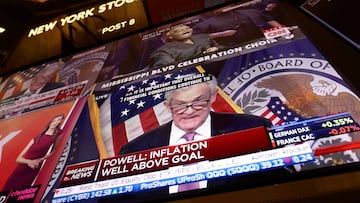Will the Federal Reserve raise rates again in March 2023?
Expectations of an increase in the speed of rate hikes have been tempered by the collapse of two US banks in the space of a week..


This month, the Federal Reserve’s Federal Open Market Committee, tasked with setting rates, has a lot of data to consider. Chair Jerome Powell is expected to announce another round of rate hikes on Wednesday, 22 March, after meeting with the other members of the FOMC on Monday and Tuesday.
Earlier this month, when testifying before Congress, Chair Powell said that the US central bank was “prepared to increase the pace of rate hikes” and that “the ultimate level of interest rates is likely to be higher than previously anticipated.” However, since these comments were made, the US has witnessed two major bank failures, requiring direct intervention by the federal government to protect depositors at a historic scale.
The impact of the SVB collapse on the Fed’s decision to increase interest rates
According to Barron’s, many of the factors that aligned to cause the run on Silicon Valley Bank wouldn’t have been possible without the Fed’s rate increases.
Now, the Fed must decide whether they want to continue to push up interest rates under conditions of widespread uncertainty or take a more ‘wait and see’ approach. The second option has support from a broad set of actors — economist Joseph Stiglitz, Senator Elizabeth Warren, and comedian Jon Stewart— and as the impacts of the bank collapse begin to be felt, the contingency is growing.
Chair Powell has said that the central bank expects labor market conditions to soften as rates are pushed up, which could lead to millions losing their jobs. During an interview with former Treasury Secretary Larry Summers, satirist Jon Stewart asked why it was that rates needed to be raised to a level that threatened the jobs of working-class people. Summers responded that “if you talk to African American voters, [...] Hispanic voters, [...] voters without a college degree, they regard the country’s biggest problem as having to do with inflation.” In other words, since inflation hurts those with the lowest incomes, it should be the Fed’s main priority to stabilize prices, even if that leads to job losses.
Last year, MarketWatch reported on a speech delivered by Summers where he argued that get inflation back under two percent, the US economy would need to see unemployment rise to ten percent for one year, 7.5 percent for two years, or six percent for five years. The subtext of the argument being, so long as up to sixteen million workers are ripped from the labor market, aggregate demand by households will fall, and firms will be forced to bring down prices.
Stewart countered Summers and asked if it is working class people that are being harmed the most by inflation, why it made sense to address the problem by “throw[ing] ten million of them out of work, so we don’t all have to share in that burden.” Summers may want to use the economic pain of working-class people dealing with inflation as a reason to support rate hikes, but if those same people are the ones losing their jobs, it is hard to argue that they are better off. No one would argue that an unemployed person is in a better position to combat inflation than someone with a job. Real wages have fallen for workers, as corporate profits have never been higher, but it will be those whose labor created those profits that are made to pay the highest price for inflation.
We shall ‘wait and see’
Related stories
The SVB collapse showed the public how quickly the government can come to the aid of millionaires and billionaires. The Fed is expected to increase rates by a quarter of a percent this week. If unemployment does begin to rise, as Chair Powell has predicted it will, the legitimacy of the political establishment that upholds these large financial institutions could begin to crack even wider.
Larry Summers and the Federal Reserve can blame workers’ wages all they want, but in real terms, incomes remain at the same point they were in February 2020. Any nominal increases earned by workers during the pandemic have been eaten up by inflation and, on average, no longer add any additional purchasing power to a worker’s wallet.

